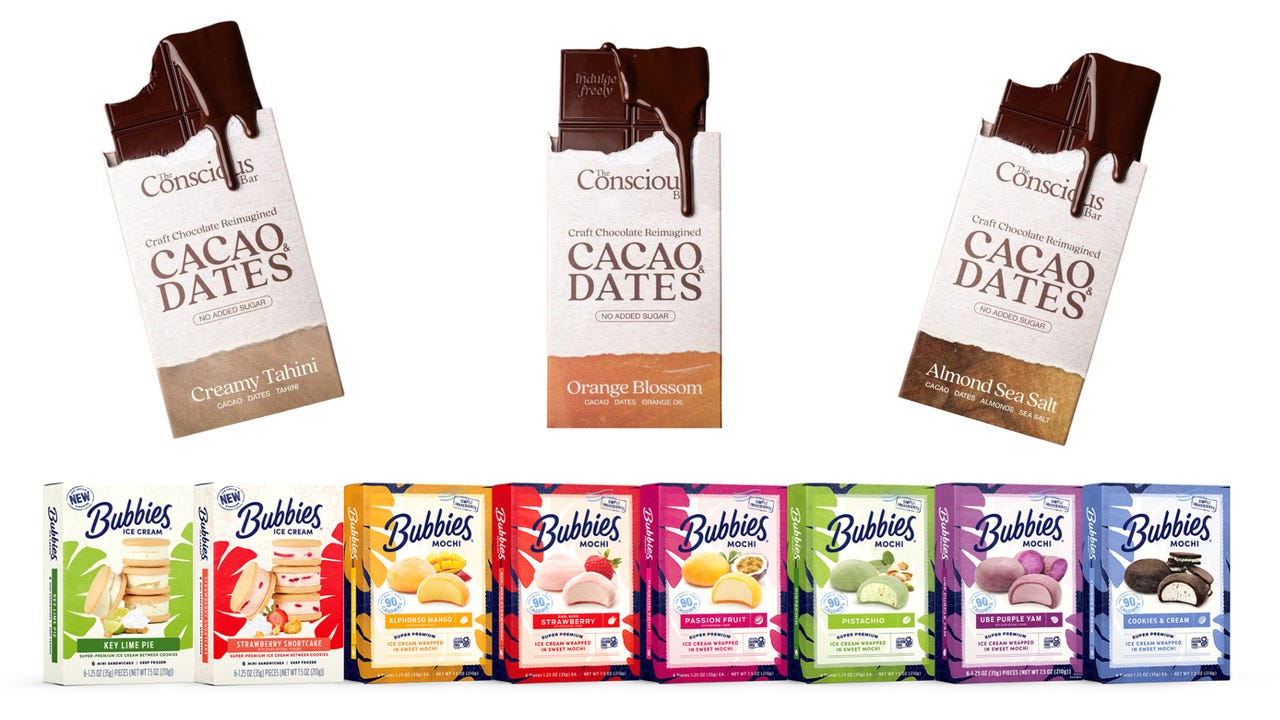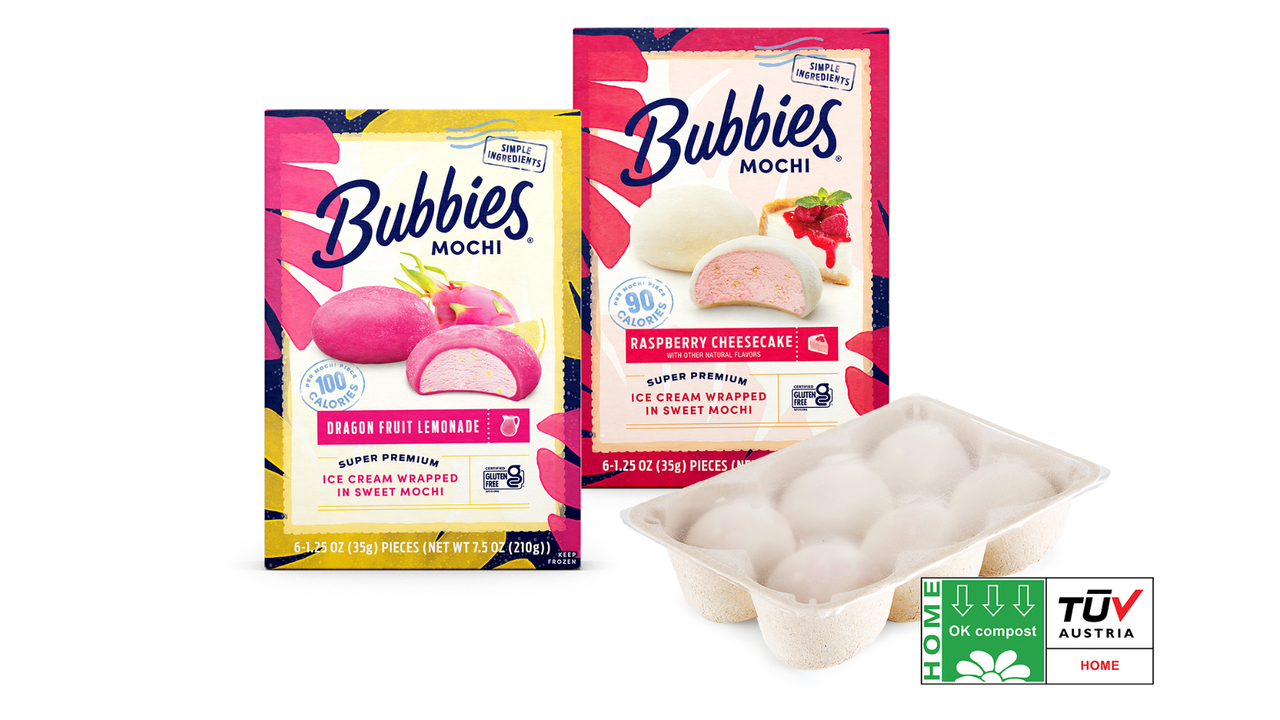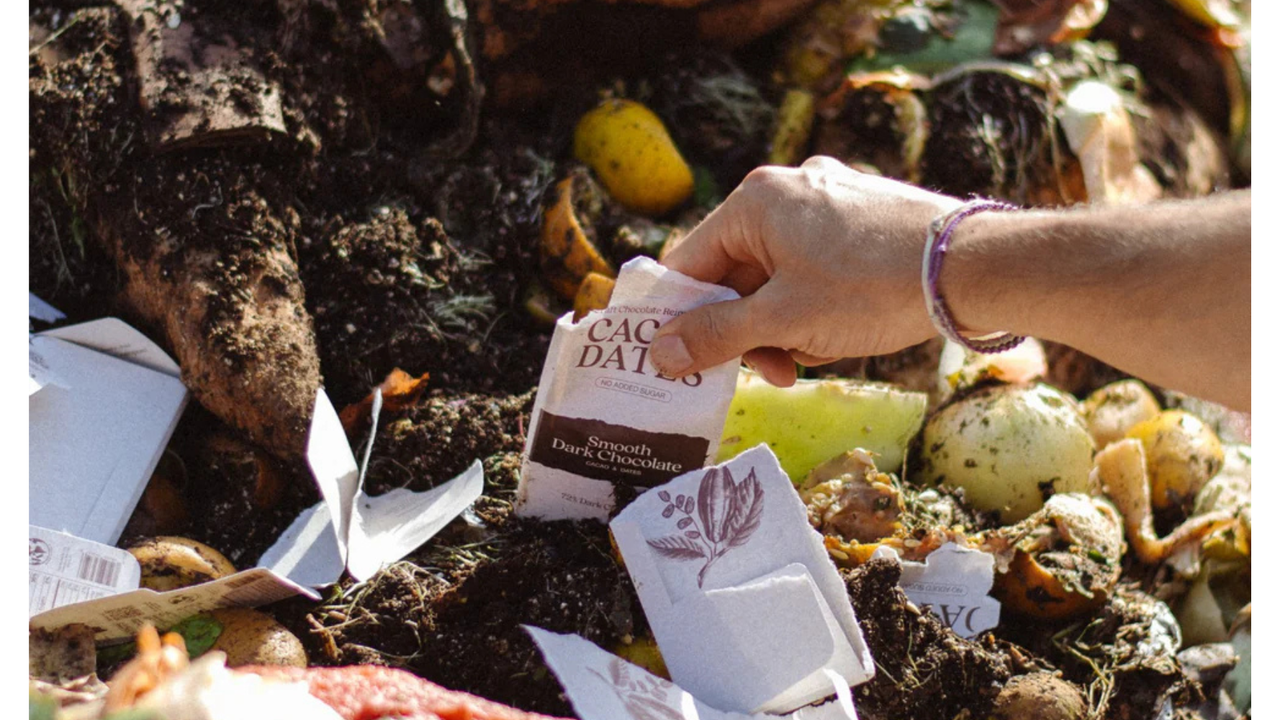How two confection brands are sweetening sustainability with compostable packagingHow two confection brands are sweetening sustainability with compostable packaging
Discover how Bubbies Mochi and The Conscious Bar are winning consumer loyalty by pioneering compostable alternatives to traditional plastic packaging.

At a Glance
- Bubbies replaced plastic trays with compostable packaging, eliminating 94% of its plastic use while saving costs.
- Sustainability is central to The Conscious Bar's identity, a chocolate brand using 100% compostable packaging from day one.
- Both brands overcame sustainable packaging challenges to drive long-term growth and generate consumer loyalty.
Packaging materials rarely steal the spotlight in the CPG world, where ingredients, branding and taste often command attention. Yet behind the scenes, sustainable packaging innovation has made remarkable progress, giving consumers something to get excited about. As concerns about plastic's impact on both human health and the environment intensify, brands transitioning to compostable packaging are redefining industry leadership and staying ahead of the curve.
Yet we've all suffered through the frustration of a paper straw collapsing mid-drink or a wooden utensil that compromises a product's flavor. Fortunately, recent advancements in sustainable packaging now deliver seamless consumer experiences.
In the confectionery space, two brands are leading this packaging revolution, giving dessert lovers additional reasons to indulge. First is Bubbies Mochi Ice Cream, which transitioned from plastic to compostable clamshells at the beginning of 2025, slashing its plastic usage by 94%. Second is The Conscious Bar, an organic chocolate brand that has utilized 100% compostable packaging since its inception.
Mission-driven sustainability
Yaniv Simpson founded The Conscious Bar in 2019 with an ambitious vision: Create exceptional chocolate without compromising sustainability principles. For Simpson, who grew up surrounded by oceanic natural beauty, using organic ingredients and ethical sourcing wasn't sufficient; his packaging needed to actively contribute to environmental solutions.
"When you look at what plastic waste is doing, the impact to countries and ocean reefs, it paints a very ugly picture," says Simpson. "The goal was to not be part of the problem."
Similarly, Bubbies Mochi Ice Cream crafts premium mochi while remaining committed to "keeping paradise clean." The company initially focused on consumer-facing sustainability initiatives such as beach cleanups but recognized that meaningful impact would also require addressing its packaging directly.
"Consumer-facing programs can only go so far," says Theresa Sarna, senior marketing manager at Bubbies. "We wanted to get out of plastic clamshells and find a solution that wouldn't compromise the integrity of the product or the customer experience."

By switching to compostable clamshells, Bubbies has reduced its plastic use by 94%.
Navigating technical challenges
Simpson quickly discovered that developing fully compostable packaging for his preservative-free chocolate, which requires specific temperature and humidity conditions, was going to be a challenge, especially as a small brand.
Manufacturers sent him "green books" of different packaging options, but to Simpson, most appeared more greenwashed than genuinely sustainable. His challenge was compounded by needing both interior and exterior sleeves for his product.
Dissatisfied with available options, Simpson took initiative by personally testing exterior sleeve biodegradability at a Miami composting facility, Compost For Life. After extensive trial and error, he found a 100% post-consumer waste option that completely decomposed within 120 days.
The interior sleeve, which directly contacts the chocolate, required nearly nine months to perfect. "Since our product has no binders or preservatives, it's a very delicate equation to have packaging that maintains perfect humidity and temperature," Simpson explains. The solution: a cellophane sleeve made from eucalyptus fibers that balances functionality with sustainability.
Bubbies encountered its own unique challenges. "Being in frozen novelties creates a different experience," notes Sarna. "The product needs to be able to freeze properly, and finding a vendor that would partner with us was our biggest challenge." After a year-long search, Bubbies collaborated with Earthcycle to design a compostable tray capable of withstanding freezing temperatures while preserving product quality.
Securing retailer buy-in can present another obstacle for brands transitioning to compostable packaging. Bubbies anticipated that retailer implementation would differ significantly from the consumer rollout and prepared accordingly.
"The retailer needs notice; there are supply chain and quality assurance questions. They need to know [that] it meets their criteria," Sarna explains. "It was a long process [with many] questions."
Despite these additional steps, retailers ultimately embraced the change enthusiastically. "We've had a lot of great excitement not only from consumers but on the retailer side as well."
The marketing advantage
A common assumption suggests compostable packaging costs more than plastic, but this all depends on how you look at it. Although research and development requires an initial investment, the long-term benefits are substantial. Increasingly, consumers seek products with reduced environmental footprints. When effectively marketed, sustainable packaging generates buzz, attracts new customers and fosters brand loyalty.
"We had heard from our customers that there was [too] much plastic in the tray, and we knew they would care about the switch," says Sarna. "We were so excited to bring the compostable trays to our customer base."
To spread awareness, Bubbies launched a comprehensive media campaign, partnering with sustainability influencers, sharing extensively on social media, creating educational videos and organizing a home composter giveaway. The social engagement surrounding the transition has been remarkable, Sarna notes, energizing longtime fans while drawing in new customers. Perhaps most surprisingly, the compostable clamshells Bubbies now uses actually cost less than their plastic predecessors.
For Simpson, sustainable packaging forms the core of The Conscious Bar's identity and marketing approach. "We have a chocolate company, but we are also in the storytelling education business," he explains. "Being native to business-to-consumer, storytelling is a great medium."

"We can inspire future generations, especially in CPG, where the second letter literally stands for packaging, to lead with truth and transparency," says Yaniv Simpson. PC: The Conscious Bar.
The future of packaging
As sustainable packaging technology evolves, the options available to brands increases. "There have been huge advancements in the sustainable packaging space," Sarna observes. "At Expo West, the growth of sustainable vendors [has been] huge and gave [us] more options."
For Bubbies, compostable trays represent just the beginning. "This is a steppingstone to having the most sustainable packaging in the frozen aisle," Sarna says. "We have a path forward and are testing new things."
Simpson predicts sustainable packaging will transform from "nice to have" to "mandatory" within five years. Despite financial and technical obstacles, Simpson remains committed to setting an example. "It's simple; do the right thing. We can inspire future generations, especially in CPG, where the second letter literally stands for packaging, to lead with truth and transparency."
About the Author
You May Also Like


